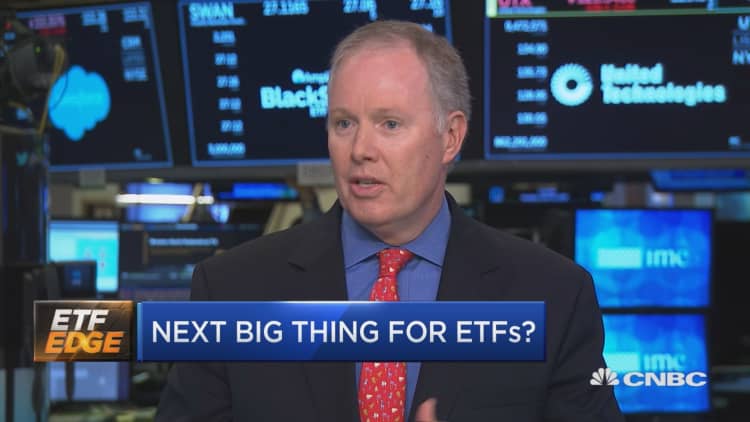
Transparency is key... or is it?
In the world of exchange-traded funds, that idea is now officially being put to the test, with the Securities and Exchange Commission granting approval for the first-ever non-transparent, actively managed ETF structure last week.
Unlike most traditionally structured ETFs, which reveal their holdings every day, this structure — created by Precidian Investments in partnership with Activeshares — allows fund managers to keep their holdings confidential. Compared with actively managed mutual funds, which are similarly structured, this is more tax-efficient, according to Precidian's website.
Stuart Thomas, a principal at Precidian Investments who had a direct role in building this framework, says this represents a world of new opportunities for investors.
"Precidian ActiveShares is the first and only SEC-approved ETF that seamlessly integrates the benefits of active management with all of the efficiencies of today's ETFs," Thomas said Monday on CNBC's "ETF Edge." "We think that's incredibly important from both a market-making standpoint, [and] also from a tax efficiency standpoint."
For Thomas, simplicity is key, which is why this structure "works just like SPDR does," he said, referring to State Street's popular ETFs. Like a standard ETF, Precidian's framework offers in-kind creations and redemptions, which allow for purchases and payouts to be made with things other than cash.
"We think simple is the best solution. And I think that the elegance in this solution is the actual simplicity," Thomas said. "From the standpoint of the broker or the end user, it looks like any other ETF on the exchange."
And, according to Thomas, demand has been off the wall.
"I think we truly underestimated how big this was going to be. Our phones are ringing off the hook," he said, adding that the callers ranged from active managers to custody banks to market makers to candidates for the role of authorized participant representative, one of the two roles in this structure that are privy to the ETF's holdings.
"We have no time for outgoing calls," Thomas said.
Investment firms are also getting in on the action. American Century and Gabelli Funds have already filed for their own versions of this ETF, and BlackRock, Nuveen and Nationwide are among the growing list of Precidian's licensees, Thomas said.
Christian Magoon, founder and CEO of Amplify ETFs, said this move will serve to "expand the ETF tent" and double down on the benefits of active management.
"The challenge is advisors who use ETFs today tend to be index- or passive-centric, not active-centric, so I see this as more of an expansion of the ETF tent for issuers as well as users. That's going to be interesting to watch," he said in the same "ETF Edge" interview.
But for market watchers like ETFTrends.com editor and proprietor Tom Lydon, who acknowledged the inherent benefits of not revealing an ETF's holdings every day, one question remains.
"Those of us in the business question the plumbing, because is it still going to work?" he said on "ETF Edge."
As of Monday, about a month after the SEC approval, Precidian had licensed this framework out to 20 firms, Thomas said. For a recurring fee, the firm licenses its technology out to other organizations and offers to act as a sponsor for the products.





